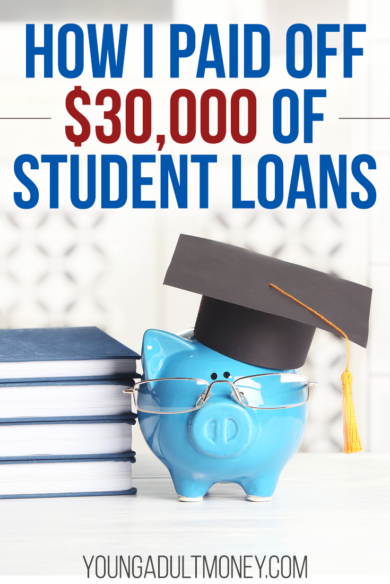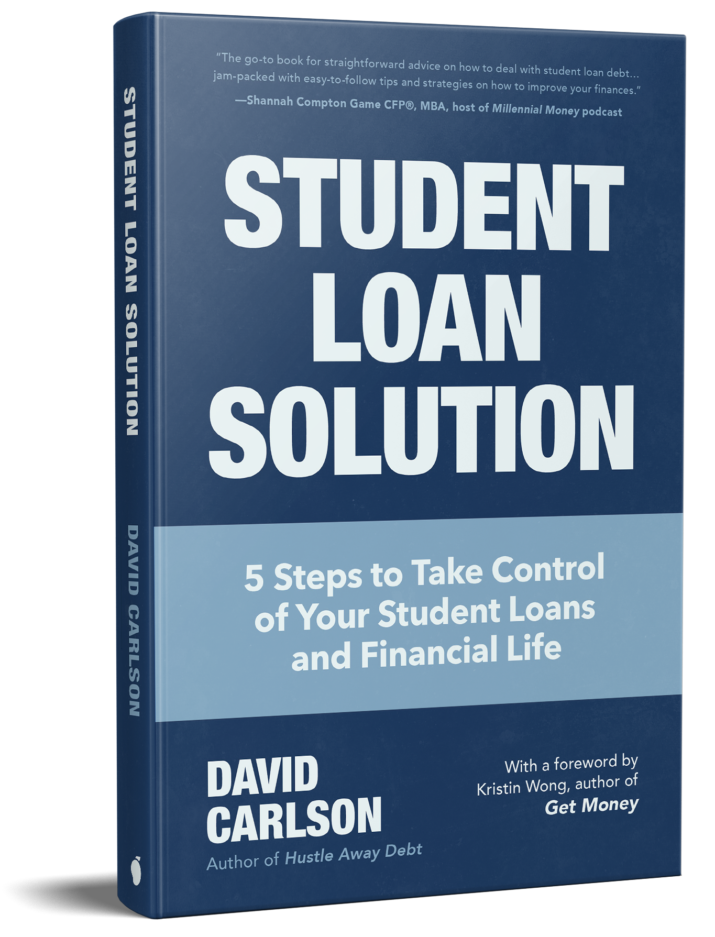 Four years after graduating college, I’m free from my student loan debt.
Four years after graduating college, I’m free from my student loan debt.
I managed to pay off $30,000 of student loan debt. It wasn’t an easy journey by any means. Regardless, my student loan debt forced me to take a good, hard look at my financial situation and taught me some lessons, albeit hard lessons, along the way. Here’s exactly how I paid off $30,000 of student loan debt.
I Faced Reality
This step was truly the hardest step of all. When I graduated college, it was so hard to acknowledge my debt for what it was. Part of me wanted to run and hide from it. And yet, part of me wanted to just accept it for what it was and pay it off in 10 to 15 years…which is what I was told was a “normal” repayment period.
After diving into the world of personal finance, I finally stopped skirting around my student loans and took ownership of them instead. I got mad at my debt, and forced myself to pay attention to it.
This step was so critical for me, and I think it’s a necessary step for anyone. Think about this in every area of your life. For example, if you want to get in shape, at some point you need to come to terms with the fact that you need to workout. If you want to make more friends, you have to know you will need to push yourself to join in on more social interactions than what may be comfortable for you. Once you take ownership of your reality and the feelings that come with it, then change can take place.
I Reeled in my Spending
Since I was a recent college graduate with a relatively low income and moderately high student loans, the first place I looked to gain control was my spending. As a new college graduate, it could have been easy to fall victim to lifestyle inflation. Instead, I did everything in my power to live even more frugally than ever.
At this point in my debt repayment journey, every single dollar made a huge impact on my overall finances, whether I spent it or saved it. Being new to the workforce, I knew I had a ton of time on my hands, so there really was no need to buy any expensive convenience products. Instead, I cooked at home, packed my lunches, clipped coupons, and went on a shopping ban. I also moved in with roommates to save more money, plus I kept my old, run down car instead of buying a new one. All of these moves allowed me to continue to pay off my student loans without having to go into further debt.
I think this is a common misstep for many recent college graduates. It can be so tempting to succumb to the idea of lifestyle inflation when you finally have a steady stream of income coming in. But remember, with debt, your money is already spoken for. At some point, your money is going to have to go towards your debt, and it’s cheaper to pay it off now than to allow interest to accumulate.
I Side Hustled…
About a year after graduation, I started to mess around with creating a blog. This blog allowed me to land my first freelance writing client, and I magically had a side hustle overnight! Even when I was only earning an extra $100 a month at first, I put every penny of that income towards debt. That allowed me to drastically increase my student loan payments.
Once I landed that first freelance writing client, I was able to find more and more work. Eventually, after just two years of consistent side hustling, I was able to earn a full-time income from my freelance writing gig (which was on the side). My side hustle is really what allowed me to pay off most of my debt. Now that my student loan debt is gone, my side hustle income is allowing me to rapidly achieve other financial goals, such as increasing my emergency fund, saving for retirement, and investing.
…And I Increased My Income at My Full-Time Job
Side hustling is great, but don’t forget to look for ways to earn more money for the time you spend at a full-time job, too. If you’re going to be spending 40+ hours a week in an office somewhere, you might as well try to increase your pay.
Even though my first job out of school didn’t pay much, I worked hard and made a couple job switches. I set a goal to earn a promotion with a step-up in pay and responsibilities, and I got it. After every promotion, instead of allowing myself to increase my lifestyle, I put the difference towards debt or savings. And that made a huge difference.
I Checked My Accounts Daily
You can’t hide from your debt. If you try, you’ll just find yourself in a worse position. I checked my student loan balance and bank accounts every single day.
Anyone who looked at my student loan repayment history would have noticed dozens of tiny $10 or $20 payments. That’s because every time I had an extra $20 from, say eating in instead of going out to dinner, I used the difference to pay down some debt. Those tiny payments might not have seemed like much, but it was a great way for me to really tie in the importance of my spending habits. Every dollar really does count!
I was Selective about Advice
Lastly, I surrounded myself with the advice I wanted to hear. When I was paying off my student loans, not everyone understood why I was so committed. I was told countless times to just relax, or was told that debt “wasn’t that bad.” While this advice had good intentions, I knew I had to ignore it and keep on pushing towards my goal.
I found a community within the personal finance niche and connected with so many people who were working towards the same goal I was. Finding that support was key in my journey. Several times, when I just felt like giving up, I was able to connect with a friend who would continue to push me towards my goal, even when I didn’t want to.
You can find support anywhere, whether it’s through blogs, social media, books, or peers who are in the same position as you.
Have you been working to pay off student loan debt, or other types of debt? What tips do you have? How do you stay motivated to meet your financial goals?


lovely and encouraging post, thanks for sharing!!!
Aw, thank you Giulia.